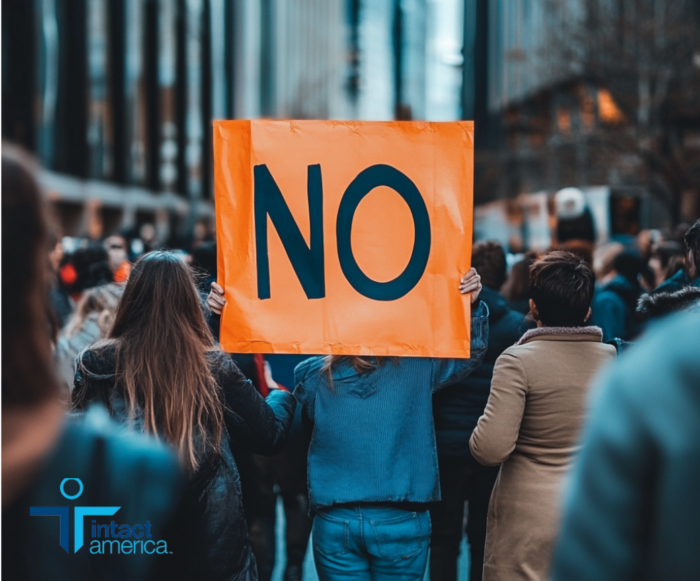
Have you ever wondered why some of the most passionate voices in a movement might not always be the most effective?
When it comes to the fight against circumcision, this question takes on a profound significance.
Victims of circumcision possess powerful, deeply personal stories that highlight the physical and emotional toll of this procedure.
Yet, these very individuals often face unique challenges that can hinder their advocacy efforts.
In this article, we explore the psychological dynamics that affect victim advocates and how their experiences are crucial in the movement against circumcision.
“A study published in the British Journal of Urology International in 2007 found that the five most sensitive areas of the penis are on the foreskin. Circumcised men had lower sensitivity on their circumcised organ compared to the intact organ of uncircumcised men.”
— Sorrells ML, et al. BJU Int. 2007
The Power of Personal Experience
How do you react when someone shares their story of pain and survival?
Personal experiences naturally draw our attention and empathy.
Victims of circumcision bring forth narratives that statistics alone cannot capture.
“Circumcision meets the clinical definition of trauma as it involves a violation of physical integrity. Research indicates that medical traumas in childhood and adolescence share psychological elements with childhood abuse, such as physical pain, fear, loss of control, and perception of the event as a form of punishment. Procedures involving children’s genitals have been found to produce negative psychological effects similar to those of childhood sexual abuse, including dissociation and the development of a negative body image.”
Their stories lay bare the physical and emotional scars left by the procedure, offering a raw, authentic perspective that can be deeply moving.
For example, consider the story of John Toenjes, who described how his circumcision at birth affected his relationships and romantic intimacy, contributing to the ending of three marriages and immense distress.
“How could cutting off a sexual body part not affect the mechanics and quality of the victim’s sex life, sexual relationships, and psyche?” asks Chapin. “You’re missing blood vessels, muscle, specialized nerve endings, and other features unique to the foreskin designed for the optimal performance, protection, pleasure, and satisfaction of the man—and his partner.”
– Georganne Chapin, Author of “This Penis Business“
The Emotional Toll on Victims
Can you imagine reliving your most traumatic experience over and over again?
For many victims of circumcision trauma, advocacy means just that.
“Studies of men who were circumcised in infancy have found that some men experienced symptoms of post-traumatic stress disorder, depression, anger, and intimacy problems that were directly associated with feelings about their circumcision (Boyle, 2002; Goldman, 1999; Hammond, 1999).”
These emotional burdens can make sustained advocacy efforts particularly taxing, causing immense strain on their mental health.
In other cases, the trauma of circumcision has been so normalized that the victim isn’t even fully aware of how the medically unnecessary surgery has affected them.
More often than not, this is the case because the victim has nothing to compare it to, lacking the context of ever having a memory of being intact.
In other words, the victims themselves are frequently ignorant of the harm that has been done to their bodies.
“Circumcised men are 4.5 times more likely to be diagnosed with erectile dysfunction (ED).”
– via International Journal of Men’s Health
The Risk of Re-traumatization
Is it possible to heal when you’re constantly reopening old wounds?
For circumcision victims, each recounting of their story can trigger re-traumatization, bringing back the pain and emotions associated with their experience.
“A study from the National Institutes of Health found that without appropriate pain management, 20-60% of circumcised neonates exhibited prolonged, vigorous crying and increased heart rate during and after the procedure.”
This ongoing struggle can drain their energy and focus, making it difficult to maintain effective and consistent advocacy.
But we need real stories from real people to spread awareness and create a ripple effect of change.
So while we need to be compassionate in how we get these stories, we have to encourage victims to speak up.
Credibility Challenges
Why do people often question the credibility of passionate advocates?
In a world that values objective viewpoints, deeply emotional voices can sometimes be dismissed as biased.
In the circumcision debate, this skepticism is particularly pronounced.
Cultural and medical norms are deeply entrenched, and a victim’s passionate plea might be unfairly viewed as lacking objectivity, even when their arguments are valid and well-founded.
The Need for Strategic Advocacy
What makes advocacy truly effective?
It’s not just passion, but also strategic thinking, organization, and the ability to engage with diverse stakeholders.
Professional advocates, who approach the issue from a broader perspective, are often better equipped to build coalitions, navigate political landscapes, and craft persuasive arguments.
Organizations like Intact America combine professional expertise with personal testimonies to strengthen the anti-circumcision movement.
Balancing Personal Narratives with Professional Advocacy
Should victims’ voices be sidelined? Absolutely not.
Their stories are essential for raising awareness and humanizing the issue.
The key is balance—integrating personal narratives within a broader, professionally guided advocacy framework.
Victims’ experiences should complement strategic efforts, making the overall movement more robust and impactful.
“In 1966, after an 8-month-old named Bruce Reimer lost his penis to a horribly botched circumcision, doctors persuaded his family to allow gender-reassignment surgery and raise him as a girl. Reimer later re-declared himself male, and eventually took his own life, at 38, in 2004.”
— New York Magazine
Case Studies and Statistics
Did you know that circumcision rates in the U.S. have been declining?
According to the CDC, around 58.3% of male infants were circumcised in 2010, a significant decrease from previous decades (CDC, 2014).
This decline indicates growing awareness and changing attitudes toward circumcision.
Moreover, data from the Global Health Data Exchange shows that circumcision rates vary significantly worldwide, with countries like Denmark, Finland, and Japan having rates below 5%, reflecting different cultural and medical norms (Global Health Data Exchange, 2020).
This stark contrast highlights the influence of cultural practices on medical decisions.
The medical establishment’s promotion of circumcision has been influenced by various factors over the years, including historical medical theories, cultural practices, and financial incentives. Some critics argue that the perpetuation of circumcision by healthcare providers may not always be driven by clear medical necessity but rather by tradition, societal norms, or potential revenue.
– Georganne Chapin, Author of “This Penis Business“
Psychological impacts are also significant.
A study published in the Journal of Pediatric Psychology found that circumcised men reported higher levels of emotional distress and feelings of violation compared to their intact counterparts (Boyle, G., et al., 2021).
Another study conducted by the National Organization of Restoring Men (NORM) reported that 78% of surveyed men who underwent circumcision later in life experienced regret and emotional distress (NORM, 2019).
These findings highlight the importance of addressing the psychological consequences of circumcision and integrating this knowledge into advocacy efforts.
Challenges Faced by Victims in Advocacy
Why do societal taboos and medical endorsements matter?
Societal taboos around discussing male genitalia and sexual health can silence victims, making it difficult for them to find platforms and be taken seriously.
Additionally, the medical community’s support for circumcision, citing health benefits like reduced risks of urinary tract infections and sexually transmitted infections, can further complicate advocacy efforts.
This medical endorsement often undermines victims’ testimonies, making it harder to shift public opinion.
The Role of Advocacy Organizations
How can organizations like Intact America amplify victims’ voices?
Intactivist organizations provide crucial support, helping victims share their stories effectively and sustainably.
By blending emotional narratives with professional advocacy, they can challenge entrenched norms and medical practices more effectively.
About Intact America
We at Intact America are at the forefront of the movement against routine circumcision.
Founded in 2008, our mission is to protect all babies and children from unnecessary genital surgery and to ensure that they have the right to make their own decisions about their bodies.
We believe that every child deserves to be protected from harm and to have their bodily integrity respected.
Our work involves educating the public, engaging with policymakers, and supporting those affected by circumcision.
By amplifying the voices of victims and combining their powerful stories with strategic advocacy, we strive to create lasting change.
Strategies for Effective Advocacy
What strategies can enhance the impact of anti-circumcision advocacy?
- Education and Awareness Campaigns: Disseminating accurate information about the risks and consequences of circumcision can help shift public opinion. This includes debunking common myths and providing a balanced view of the procedure.
- Support Networks for Victims: Establishing support networks can help circumcision victims cope with their experiences and empower them to become effective advocates. These networks offer emotional support, resources, and platforms for sharing their stories.
- Engaging Medical Professionals: Collaborating with medical professionals who oppose circumcision can lend credibility to advocacy efforts. These experts can provide authoritative counterarguments to pro-circumcision claims.
- Legal Advocacy: Pursuing legal avenues to challenge circumcision practices can drive significant change. This includes advocating for informed consent laws and contesting non-consensual circumcisions in court.
- Coalition Building: Forming coalitions with other advocacy groups can amplify the impact of anti-circumcision efforts. Partnerships with organizations focused on children’s rights, bodily autonomy, and sexual health can strengthen the movement.
Conclusion
Can the voices of circumcision victims drive meaningful change?
Absolutely. However, their effectiveness can be limited by their ignorance or denial of their experiences, compounded by the normalization of genital mutilation.
By balancing personal narratives with professional, evidence-based advocacy and employing strategic approaches, the anti-circumcision movement can create a more compelling and effective case for change.
Organizations like Intact America are at the forefront of this effort, ensuring that victims’ voices are heard and that their stories contribute to a powerful, strategic advocacy campaign.
FAQs
Q: Why is circumcision still a common practice in the United States?
A: Circumcision persists in the United States due to cultural, religious, and supposed (yet scientifically refuted) medical benefits. However, its prevalence has been declining as more parents question its necessity and ethics.
Q: What are some of the long-term psychological effects of circumcision?
A: Long-term psychological effects can include emotional distress, feelings of violation, and sexual dysfunction. These impacts highlight the need to address the psychological consequences of circumcision in advocacy efforts.
Q: How can victims of circumcision become effective advocates?
A: Victims can become effective advocates by sharing their stories in ways that complement broader strategic goals, collaborating with professional advocacy organizations, and participating in support networks to manage their experiences.
Q: What role do medical professionals play in the circumcision debate?
A: Medical professionals significantly influence the circumcision debate. Collaborating with those who oppose circumcision can enhance advocacy efforts by providing expert testimony and countering pro-circumcision arguments within the medical community.
Q: What are some legal avenues for challenging circumcision practices?
A: Legal avenues include advocating for informed consent laws, pursuing lawsuits against non-consensual circumcisions, and challenging policies that promote circumcision without adequate justification.








No Comments